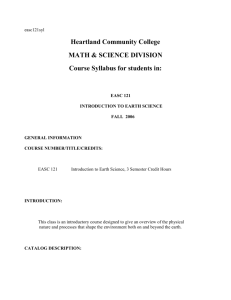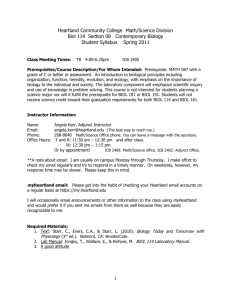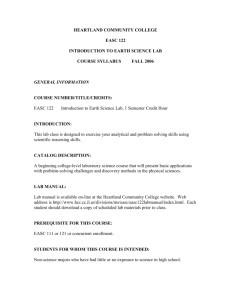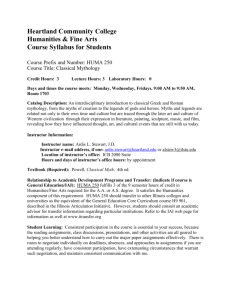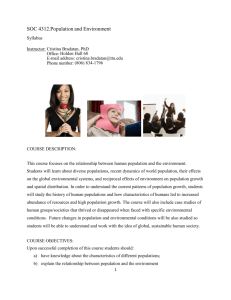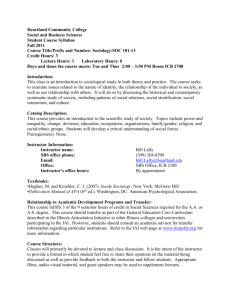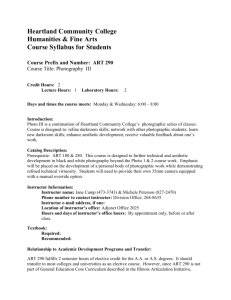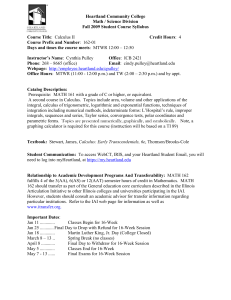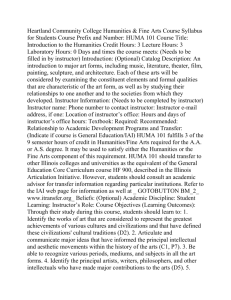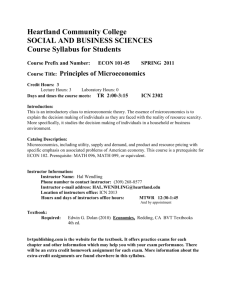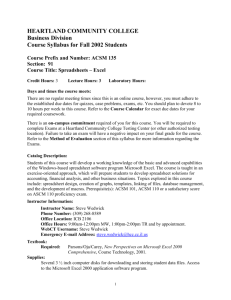econ102.cring.su03 - Heartland Community College
advertisement
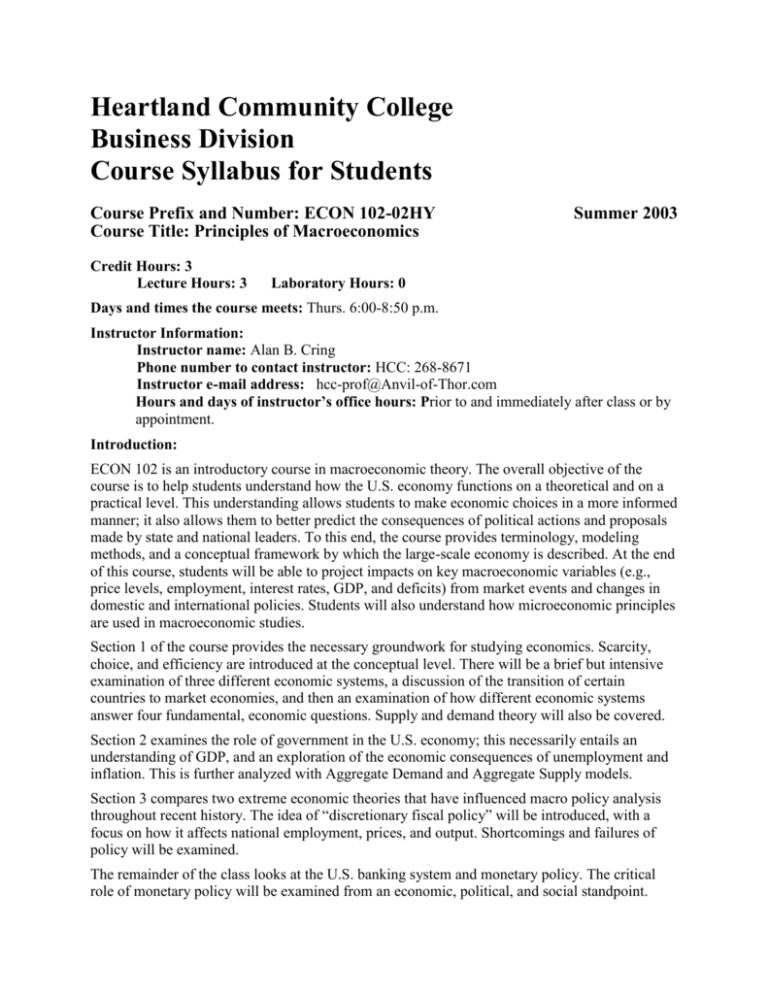
Heartland Community College Business Division Course Syllabus for Students Course Prefix and Number: ECON 102-02HY Course Title: Principles of Macroeconomics Credit Hours: 3 Lecture Hours: 3 Summer 2003 Laboratory Hours: 0 Days and times the course meets: Thurs. 6:00-8:50 p.m. Instructor Information: Instructor name: Alan B. Cring Phone number to contact instructor: HCC: 268-8671 Instructor e-mail address: hcc-prof@Anvil-of-Thor.com Hours and days of instructor’s office hours: Prior to and immediately after class or by appointment. Introduction: ECON 102 is an introductory course in macroeconomic theory. The overall objective of the course is to help students understand how the U.S. economy functions on a theoretical and on a practical level. This understanding allows students to make economic choices in a more informed manner; it also allows them to better predict the consequences of political actions and proposals made by state and national leaders. To this end, the course provides terminology, modeling methods, and a conceptual framework by which the large-scale economy is described. At the end of this course, students will be able to project impacts on key macroeconomic variables (e.g., price levels, employment, interest rates, GDP, and deficits) from market events and changes in domestic and international policies. Students will also understand how microeconomic principles are used in macroeconomic studies. Section 1 of the course provides the necessary groundwork for studying economics. Scarcity, choice, and efficiency are introduced at the conceptual level. There will be a brief but intensive examination of three different economic systems, a discussion of the transition of certain countries to market economies, and then an examination of how different economic systems answer four fundamental, economic questions. Supply and demand theory will also be covered. Section 2 examines the role of government in the U.S. economy; this necessarily entails an understanding of GDP, and an exploration of the economic consequences of unemployment and inflation. This is further analyzed with Aggregate Demand and Aggregate Supply models. Section 3 compares two extreme economic theories that have influenced macro policy analysis throughout recent history. The idea of “discretionary fiscal policy” will be introduced, with a focus on how it affects national employment, prices, and output. Shortcomings and failures of policy will be examined. The remainder of the class looks at the U.S. banking system and monetary policy. The critical role of monetary policy will be examined from an economic, political, and social standpoint. Catalog Description: Introduction to the American economic system with emphasis on macroeconomics including national income accounting, employment theory, and fiscal and monetary policies. Textbook: Required: Roger LeRoy Miller. Economics Today (2001-2002). Glenview, IL. Addison/ Wesley. Recommended: Roger LeRoy Miller. Economics Today Study Learning Guide (2001-2002). Glenview, IL. Addison/Wesley. Relationship to Academic Development Programs and Transfer: This course fulfills 3 of the 9 semester hours of credit in Social Sciences required for the A.A. or A.S. degree. This course should transfer as part of the General Education Core Curriculum described in the Illinois Articulation Initiative to other Illinois colleges and universities participating in the IAI. However, students should consult an academic advisor for transfer information regarding particular institutions. Refer to the IAI web page at www.itransfer.org for more information. Beliefs: Academic Discipline: Those striving for a college education realize it is a large time and financial commitment. You need to attend each and every class, be prepared for class discussions, and work independently to succeed on exams. You need to read the book and any other assigned materials. You need to be on time for class; you need to stay for the entirety of each class; and you need to be prepared to answer direct questions put to you during class. Student Learning: You, the student, will learn by reading the assigned materials, by listening attentively in class, by taking detailed notes, and by participating in the classroom discussions. You must also spend time contemplating the ideas, terms, and theories presented. You must do problems, and you must think carefully and deeply about the subject matter. Instructor’s Role: The teacher will provide the necessary direction and support to help you accomplish the learning outcomes of the class, and provide you with specific and timely feedback about your performance. This is an opportunity to enhance your knowledge, skills and commitment toward economics. The knowledge is provided in the lecture slides and readings. Skill development is a result of applying the knowledge in team activities, homework, the computer exercise, and exams. Knowledge and skills are external to the learner; commitment, however, comes from within. Commitment is your motivation and desire to want to learn the material. Commitment separates long-term learning and development from a short term learning experience. To facilitate your commitment, I will present the material clearly and in a manner that triggers new curiosities about the way you see yourself as a participant in our economy. Course Objectives (Learning Outcomes): 1. 2. 3. 4. 5. Demonstrate a knowledge of the concepts of scarcity, choice and efficiency. Demonstrate a knowledge of the role of the government in the U.S. economy. Demonstrate a knowledge of the economic consequences of unemployment and inflation. Demonstrate a knowledge of aggregate demand and aggregate supply. Demonstrate a knowledge of fiscal policy and how it affects national employment and output. Explain some shortcomings associated with fiscal policy, and describe how it impacts the government’s budget and the balance of trade. 6. Demonstrate a knowledge of the U.S. banking system and monetary policy, and its relation to international trade. Course/Lab Outline: Topic Outline for the Course: The following topics are to be covered during the instructional process: I. Introduction to Economics A. The Economizing Problem B. The Production Possibilities Curve C. Economic Systems and Planning D. The Simple Circular Flow Model II. Demand and Supply III. Economic Functions of the Government IV. Measurement of Economic Performance A. V. Macro Economic Instabilities A. VI. Determinants of GDP Unemployment & Inflation Equilibrium Income and Employment (Household, Business and International Sectors) VII. Aggregate Demand and Supply VIII. Fiscal Policy IX. U.S. Money and Banking System X. Money Creation XI. U.S. Monetary Policy XII. Exchange Rates and Balance of Payments Methods of Instruction: DESCRIPTION OF INSTRUCTIONAL TECHNIQUES AND RATIONAL: Independent viewing of PowerPoint Lecture Slides Independent reading of textbook chapters Lecture Recaps Discussion of textbook chapters and current events. Sources for current events will be articles from the Pantagraph, The Wall Street Journal, Economic Outlook U.S.A., Economist, U.S. News and World Report, Federal Reserve Newsletter, etc. Video tapes In-class homework Computer simulation Guest speakers This is a “hybrid” class, which means you will be responsible for learning the content of the course independently through textbook readings and by viewing lecture slides on PowerPoint. The PowerPoint slides have voice narration, so remember to turn the volume up on your personal computer to view. You will not be able to complete the course if you do not have access to a pc with Microsoft Power Point. We will meet every Wednesday for class. In that session, you will be provided an overview of the assigned topics, and you will be given conceptual and work-out problems to solve. You need to come prepared to complete multiple homework sets when we meet. Most of the assignments will be due before the end of the evening and cannot be completed outside of class. You will need to complete the assignments to score well in the class. Make up assignments will not be permitted nor given. DESCRIPTION OF THE LEARNING FORMAT: Attend every class. Study the required materials (i.e. lecture slides and assigned textbook chapters). Come prepared to participate in class and complete assignments. Relate course material to current events and life experiences. Complete all written assignments. Complete all exams. Course Policies: Method of Evaluation (Tests/Exams, Grading System): GRADING SYSTEM Course work for this class includes written homework assignments, 3 term exams and a final exam. The grade you earn for the class is determined in the following way: Test 1 20% Test 2 20% Test 3 20% Homework 15% Final Exam 25% Total 100% HOMEWORK AND EXAMS: Homework assignments consist of problems that require written explanations as well as graphical and mathematical analysis. Some of the homework will be completed inside of class and some will be completed outside. One homework is computer-based. You will be provided the opportunity to “manage” the economy through a computerized macroeconomic simulation program. This will enable you to experience first-hand some of the obstacles that confront our fiscal and monetary authorities as they try to achieve the economic goals of our nation. The purpose of the homework is to help you apply the theories learned in the lecture slides and textbook readings and to prepare for the exams. The purpose of the exams is to determine if you can apply the macro model to real world events. Tests will be completed in the college Testing Center outside of class time. Normally, you will have a 4-day span for you to complete the tests. The Testing Center is located in the Student Commons Building, Room 1300. You should contact the Center to confirm Summer Hours (268-8231). Participation (or Attendance): Economics is a cumulative course by nature and the summer session moves very rapidly. It is important that you remain current with the material as we progress through the semester. You are strongly encouraged to attend class regularly. Homework problem sets will be completed during class time. Missed scores will be counted as “zeros” and cannot be made up. Do not ask about this, and do not ask for special treatment; you will not get any. You lowest homework score is dropped. This means that, if you take a zero on one of them because you were not in class that night, the zero will be the score that is dropped. Test material is taken directly from the class lecture notes, problem sets, and discussion. Classroom attendance will not officially be taken on a regular basis, however consistent absences may be taken into consideration when determining final grades and more specifically when you are at the border line between a respectable and less respectable letter grade. Incompletes: An incomplete grade would be issued only in the most extraordinary situation. An Incomplete must be arranged with the instructor on a case-by-case basis and in alignment with college guidelines. Extra Credit: No extra-credit is given. Make-up of tests and assignments: There are no make-up homeworks or exams given. If you miss an exam, the weight of your final exam will be adjusted by the amount of the missed exam. Missed homework scores are recorded as a zero. To avoid a zero score, be sure to get to class and complete the assignments on time. Deadlines: All class work must be completed and turned in to the instructor prior to or at the deadline. Homework and tests submitted after the deadline are not acceptable for a grade. Again, do not even bother to ask for special consideration; it will not be given. Required Writing and Reading: This course requires approximately 30-40 pages of reading per week or 500 per semester. A minimum of 15 pages of college level writing is required in this course. Writing assignments include papers of various lengths, essay exams and various projects as deemed appropriate by the instructor. Student Conduct: Academic cheating will result in immediate dismissal from the class and prosecution to the fullest extent permitted by Heartland Community College. Lectures and class discussions may not be recorded. Attention should be focused at all times on the lecture, discussion, or other presentation that is the subject of the class. Academic Integrity and Plagiarism Academic Integrity Academic integrity is a fundamental principle of collegial life at Heartland Community College and is essential to the credibility of the College’s educational programs. Moreover, because grading may be competitive, students who misrepresent their academic work violate the right of their fellow students. The College, therefore, views any act of academic dishonest as a serious offense requiring disciplinary measures, including course failure, suspension, and even expulsion from the College. In addition, an act of academic dishonesty may have unforeseen effects far beyond any officially imposed penalties. Violations of academic integrity include, but are not limited to cheating, aiding or suborning cheating or other acts of academic dishonesty, plagiarism, misrepresentation of data, falsification of academic records or documents and unauthorized access to computerized academic or administrative records or systems. Definitions of these violations may be found in the college catalog. Plagiarism Plagiarism is the presenting of others’ ideas as if they were your own. When you write a paper, create a project, do a presentation or create anything original, it is assumed that all the work, except for that which is attributed to another author or creator, is your own. Plagiarism is considered a serious academic offense and may take the following forms: 1. 2. 3. 4. 5. Copying word-for-word from another source and not giving that source credit. Paraphrasing the work of another and not giving that source credit. Adopting a particularly apt phrase as your own Using an image or a copy of an image without crediting its source Paraphrasing someone else’s line of thinking in the development of a topic as if it were your own. 6. Receiving excessive help from a friend or elsewhere, or using another project as if it were your own. Note that word-for-word copying is not the only form of plagiarism. The penalties for plagiarism may be severe, ranging from failure on the particular piece of work, failure in the course, on through to expulsion from school in extreme cases. [Adapted from the Modem Language Association’s MLA Handbook for Writers of Research Papers. New York: MLA, 1995: 26] Support Services: Heartland Library Information www.hcc.cc.il.us/library The Library, located within the Academic Support Center (ASC) on the Normal campus, provides Heartland students with a variety of on-campus resources that support both class work and personal inquiry. These include: reference tools (print and non-print), periodicals, audiovisual materials and equipment, reserves, a general circulating collection, and a fiction collection. Computer terminals provide access to various electronic resources, including Academic Universe, FirstSearch, and EbscoHost databases; CARL online card catalog, and Internet access. Several electronic resources are accessible from computers off campus. Students may borrow books from the fiction and general collections and may renew materials, in person or by phone, if requests have not been placed on them. Heartland students also have Interlibrary Loan privileges from Heartland Library. Items usually take 1 to 3 weeks from date of the order to arrive. The Library maintains a quiet study environment. Assistance is available for all library and information needs. Heartland Library is open Monday-Thursday 7:30 a.m. to 9:30 p.m., Friday 7:30 a.m. to 4 p.m., when the college is in session, but is closed on holidays that Heartland observes. Intersession and summer hours are reduced. Milner Library at Illinois State University is a public institution so you may use their collection on site. If you want to request to check out materials, ask for a free Community Borrowers card application at the Milner Library circulation desk. It is important that you have specific titles to request for check out when you apply for the card. The card will give you access to their circulating collection for three months, with a four week check out period. To qualify for this service you must live within 50 miles of Milner, have a current state ID (driver's license) with current address on ID, and be over age 18. After you fill out the application Milner will perform a background check on you for over due books, etc. For more information about Library services please call the Library at 268-8200. Tutoring and Academic Support Heartland Community College offers learning assistance in various forms at no cost to Heartland students at the Academic Support Center (ASC) in Normal and at the Pontiac and Lincoln Centers. Tutors are available at convenient times throughout the week. Study groups, group tutoring facilitated by a specially-trained tutor, are also available by request. Help is also provided through instructional materials, study skills workshops, open computing, and the Library. For more information about services available at each location, please call the ASC in Normal at (309) 268-8235; the Pontiac Center (815) 842-6777; or the Lincoln Center (217) 7351731. Specifications for written materials: No formal papers are required. Syllabus disclaimer: The syllabus calendar is a guide for lecture topics. Time spent on any area may be increased or decreased due to the class’s interest and/or ability to understand. Academic Freedom: By far, the most important matter covered in this syllabus is the subject of academic freedom. Professor Cring jealously defends academic freedom enjoyed by the students and himself. Within his classroom, intellectual discourse is unfettered by rules otherwise imposed upon people. This has the operational end of making the student/teacher dialogue an instrument of education; in the process, the discourse can be provocative, challenging, difficult, even iconoclastic. At times, you might not understand it, and you might not like it; but you will benefit from it. When the door to the classroom closes, you and your fellow students are in the open field of ideas, a place that Professor Cring hopes you will want to make your home.
